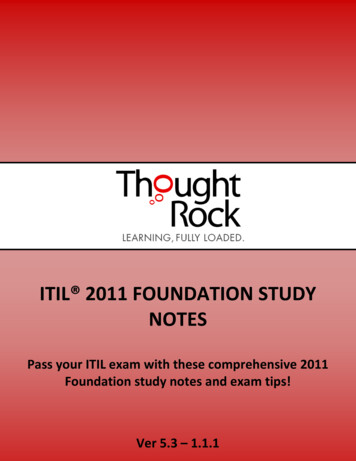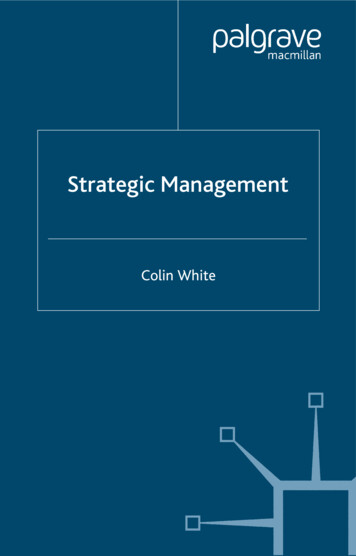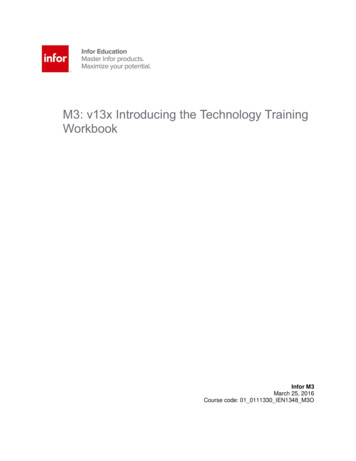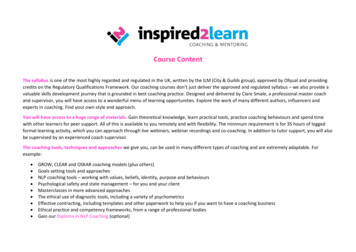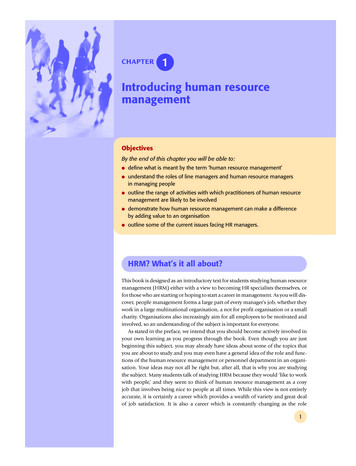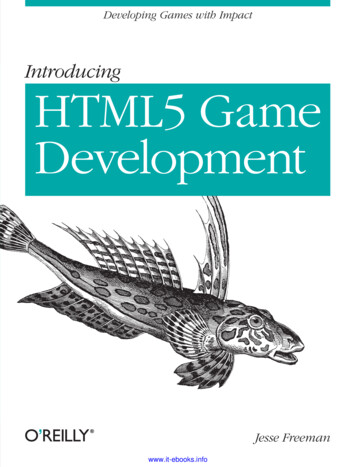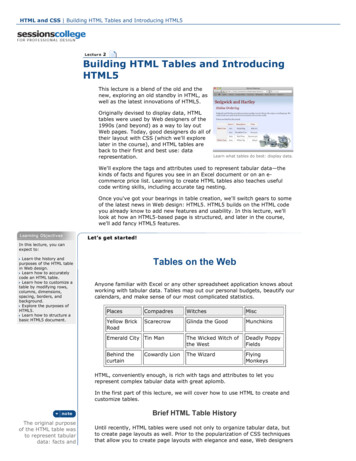
Transcription
About the AuthorsNew FeaturesTheodore Millon, PhD, DSc»Despite his humble beginnings as the sonof Polish immigrants struggling to surviveduring the Depression, Dr. Millon excelledin his collegiate studies of psychology andanthropology. After completing hisdissertation in 1953, Dr. Millon began histeaching career at Lehigh University in Pennsylvania. It wasduring his first year in this position that he began his ownevolution from merely teaching psychology to patientadvocacy, revolutionizing the assessment treatmentcontinuum, and development of the personality test thatwould eventually become today’s MCMI‑IV.»»»»»»»Full normative update, approximately 1,500 adults from outpatient and inpatientclinical settingsNew Turbulent scale, providing deeper understanding of those patients presentingwith this unbridled personality typeNew and updated test items characterizing the evolution of Dr. Millon’spersonality theoryRefreshed to increase clarity and clinical relevanceNew and improved narrative content that better integrates results withtherapeutic practiceUpdated Grossman Facet ScalesNew digital end-to-end workflow via Q-globalAligned with DSM-5 and ICD-10OverviewAdminister to: Adults aged 18 and olderAdministration Time: 25–30 minutesScoring and Reporting: Q-global , Q Local and Mail-in Qualification Level: CResponse Forms: English and SpanishScoring and Reporting Q-global»»» Administration, scoring, and reporting for the MCMI -IV are availableon Q-global , Pearson’s web-based scoring and reporting platform.Q-global features:24/7 secure, web-based accessPortable use on mobile devices, tablets, and laptopsOn-demand, reliable scoring, and comprehensive reporting solutionsMail-in and Q Local scoring and reporting options will be available soon!Dr. Millon went on to write, co-author, and edit more than30 books; held full professor roles at Harvard, Universityof Illinois in Chicago, and the University of Miami; anddeveloped a number of personality and psychologicalassessments still widely in use today. His unique, holisticapproach to diagnosis and treatment changed the waypsychologists think about personality disorders.While touring the Allentown State Hospital with hisstudents, he was appalled with the conditions the patientswere forced to endure. He contacted a local politicianrunning for state governor who widely publicized theissues at ASH as a platform for his campaign. Once thedeplorable conditions of the hospital were exposed,Dr. Millon was placed on the Board of Trustees, andbecause of his mental health degrees, was quickly votedpresident of the Board at the age of 26. The Board, led byDr. Millon, went on to effect improvements over the nextdecade that would move the hospital’s standings from22nd out of 22 hospitals in the state to first, vastly due tothe development of clinical research programs andcommunity mental health centers.It was during this time that he immersed himself intothe lives of the patients, going incognito and sleepingovernight—often entire weekends—at the hospital.He was rewarded for his efforts with a much deeperunderstanding of the patients housed in the chronic wards,and has credited his time there during “unconventionalvisiting hours” with a good portion of his inspiration forwriting Modern Psychopathology (MP) and developingdiagnostic tools such as the MCMI , the original iterationof the MCMI-IV.To view the videos, go to PearsonClinical.com/TedMillon.Seth Grossman, PsyDDr. Grossman is a licensed psychologist in the state ofFlorida. He is the founder and clinical director of theCenter for Psychological Fitness in the Fort Lauderdaleregion, as well as a member of the clinical faculty at theFlorida International University Herbert Wertheim Collegeof Medicine. For nearly two decades, Dr. Grossmanworked under the leadership of the world-renownedpersonality theorist, Dr. Theodore Millon, co-authoringseveral books, scientific articles, and personality testswith him.Dr. Grossman has also been a guest lecturer onpersonality and clinical assessment at universities andprofessional settings nationally and internationally.“A lasting imprint of Ted will be themillions of Americans who will be betterunderstood because of his tests.–UnknownPearsonClinical.com/MCMI-IV 800.627.7271 clinicalcustomersupport@pearson.com800.627.7271 Theodore Millon, PhD, DSc, Seth Grossman, PsyD, Carrie Millon, PhDDuring the development of the MCMI-IV, Dr. Millonshared his ideas on the importance of “understandingtheory and assessment and how they coordinate togetherto give us the central core of the emergence of the field ofpersonality disorders.”“The New MCMI-IV at a Glance PearsonClinical.comCopyright 2015 Pearson Education, Inc. or its affiliate(s). All rights reserved. Q-global, Q Local, Always Learning, Pearson, design for Psi, and PsychCorp are trademarks, in the U.S. and/or other countries, of Pearson Education, Inc. or its affiliate(s).DSM-5 is a registered trademark of American Psychiatric Association. MCMI and Millon are registered trademarks of DICANDRIEN, Inc. 510F217 08/15Introducing theMCMI -IVThe most widely used theory-based adultclinical personality instrumentThe MCMI-IV assessment delivers Dr. Millon’s time-tested theories onpersonality patterns in an all-new spectrum.
Advantages of Dr. Millon’s TheoryRather than starting with statistical methodology, the MCMI-IV and all the Millon inventoriesbegin with explanatory principles. This allows the clinician to grasp the how and why fromthe data, to truly understand the person behind the numbers. It blends together theory andstatistics to form a cohesive understanding of a person’s personality.“The MCMI -IV was specifically designed,as are all of the Millon Inventories,to facilitate the therapeutic plans of the clinician.—Theodore Millon, PhD, DScThe MCMI-IV helps to diagnose personality disorders and identify underlying clinical issues,and captures a broad range of personality functioning. Used in multiple settings, includingclinical and counseling, medical, government, and forensic, the MCMI-IV can help:»»»Identify deep, pervasive clinical issuesFacilitate treatment decisionsAssess disorders based on DSM-5 and ICD-10 classification systemsA Theoretical Change—Introducing a ‘Spectrum’Dr. Millon’s Disorders of Personality, Third Edition (Wiley: 2011) more fully analyzed andexplained a range of personality dysfunction and function.Each behavior is now described with three levels, broadening the range:»»»“ Normal style: generally adaptive personality patternsAbnormal traits/type: moderately maladaptivepersonality attributesClinical disorder: likelihood of greater personality dysfunctionExample: CENarc spectrum: Confident–Egotistic–NarcissisticThe major goal of the MCMI-IV is to more adequately capture thisbroader range of personality, from adaptive to maladaptive.The Grossman Facet ScalesClinical Personality Patterns and theCorresponding Grossman Facet Scales1Turbulent Scale—New!Turbulent. MCMI-IV Scale 4B: Ebullient–Exuberant–Turbulent SpectrumThe Turbulent scale on the MCMI-IV will provide clinicians with a deeper understanding of thelevels of severity found in adult patients who may be experiencing abnormal personality traits,such as a lost sense of reality or unwavering optimism. “Turbulent” refers to the more severe(disorder) end of that spectrum. The MCMI-IV can help you identify:»»»how adaptive/maladaptive it ishow it differentiates itself by virtue of different personality mixtureswhere to begin the interventionTypically energetic and buoyant in manner, the Ebullient–Exuberant–Turbulent personalitypattern is prone to vigorous pursuits of happiness. While this pattern is similar to the historicpsychoanalysis of “hypomania”, which pre-dates the modern bipolar-spectrum disorders, this isa new addition to Millon’s spectra.The high energy and generally positive attitude of moderated variants of this pattern can showconsiderable characterologic strengths. However, their tendency to be all things to all people,attempt to maintain resilience regardless of circumstance, and pressure others to respondin-kind does not always bode well. Those with less integrated variations of this pattern maybe prone to scatteredness, overstimulation, overanimation, and an inability to maintain balancewithin their environment which can adversely affect their relationships with others.Learn more about the Turbulent personality pattern and new Turbulent scale ersonally Unengaged1.2Meager Content1.3Temperamentally Apathetic2A2A.1Interpersonally Aversive2A.2Alienated Self-Image2A.3Vexatious ContentCognitively Fatalistic2B.2Worthless Self-Image2B.3Temperamentally Woeful36B.1Expressively Precipitate6B.2Interpersonally Abrasive6B.3Eruptive ArchitectureCompulsive7.1Expressively Disciplined7.2Cognitively Constricted7.3Reliable Self-Image8AMelancholic2B.1Sadistic7Avoidant2BDr. Ted Millon’s conceptualization of the Ebullient–Exuberant–Turbulent personality pattern:6BNegativistic8A.1Expressively Embittered8A.2Discontented Self-Image8A.3Temperamentally Irritable8BDependentMasochistic8B.1Undeserving Self-Image8B.2Inverted Architecture8B.3Temperamentally Dysphoric3.1Expressively Puerile3.2Interpersonally Submissive3.3Inept Self-ImageSevere Personality Pathology andCorresponding Grossman Facet ScalesHistrionicS4A4A.1Expressively Dramatic4A.2Interpersonally Attention-Seeking4A.3Temperamentally Fickle4B–New!TurbulentSchizotypalS.1Cognitively CircumstantialS.2Estranged Self-ImageS.3Chaotic ContentCBorderlineC.1Uncertain Self-Image4B.1Expressively ImpetuousC.2Split Architecture4B.2Interpersonally High-SpiritedC.3Temperamentally Labile4B.3Exalted Self-Image5PParanoidNarcissisticP.1Expressively Defensive5.1Interpersonally ExploitiveP.2Cognitively Mistrustful5.2Cognitively ExpansiveP.3Projection Dynamics5.3Admirable Self-Image6AAntisocial6A.1Interpersonally IrresponsibleScales6A.2Autonomous Self-ImageThe Grossman Facet Scales enhance the clinical interpretation of the MCMI-IV by furtherelaborating on the different personality dimensions, making connections between theprimary scales.6A.3Acting-Out Dynamics
Advantages of Dr. Millon’s TheoryRather than starting with statistical methodology, the MCMI-IV and all the Millon inventoriesbegin with explanatory principles. This allows the clinician to grasp the how and why fromthe data, to truly understand the person behind the numbers. It blends together theory andstatistics to form a cohesive understanding of a person’s personality.“The MCMI -IV was specifically designed,as are all of the Millon Inventories,to facilitate the therapeutic plans of the clinician.—Theodore Millon, PhD, DScThe MCMI-IV helps to diagnose personality disorders and identify underlying clinical issues,and captures a broad range of personality functioning. Used in multiple settings, includingclinical and counseling, medical, government, and forensic, the MCMI-IV can help:»»»Identify deep, pervasive clinical issuesFacilitate treatment decisionsAssess disorders based on DSM-5 and ICD-10 classification systemsA Theoretical Change—Introducing a ‘Spectrum’Dr. Millon’s Disorders of Personality, Third Edition (Wiley: 2011) more fully analyzed andexplained a range of personality dysfunction and function.Each behavior is now described with three levels, broadening the range:»»»“ Normal style: generally adaptive personality patternsAbnormal traits/type: moderately maladaptivepersonality attributesClinical disorder: likelihood of greater personality dysfunctionExample: CENarc spectrum: Confident–Egotistic–NarcissisticThe major goal of the MCMI-IV is to more adequately capture thisbroader range of personality, from adaptive to maladaptive.The Grossman Facet ScalesClinical Personality Patterns and theCorresponding Grossman Facet Scales1Turbulent Scale—New!Turbulent. MCMI-IV Scale 4B: Ebullient–Exuberant–Turbulent SpectrumThe Turbulent scale on the MCMI-IV will provide clinicians with a deeper understanding of thelevels of severity found in adult patients who may be experiencing abnormal personality traits,such as a lost sense of reality or unwavering optimism. “Turbulent” refers to the more severe(disorder) end of that spectrum. The MCMI-IV can help you identify:»»»how adaptive/maladaptive it ishow it differentiates itself by virtue of different personality mixtureswhere to begin the interventionTypically energetic and buoyant in manner, the Ebullient–Exuberant–Turbulent personalitypattern is prone to vigorous pursuits of happiness. While this pattern is similar to the historicpsychoanalysis of “hypomania”, which pre-dates the modern bipolar-spectrum disorders, this isa new addition to Millon’s spectra.The high energy and generally positive attitude of moderated variants of this pattern can showconsiderable characterologic strengths. However, their tendency to be all things to all people,attempt to maintain resilience regardless of circumstance, and pressure others to respondin-kind does not always bode well. Those with less integrated variations of this pattern maybe prone to scatteredness, overstimulation, overanimation, and an inability to maintain balancewithin their environment which can adversely affect their relationships with others.Learn more about the Turbulent personality pattern and new Turbulent scale ersonally Unengaged1.2Meager Content1.3Temperamentally Apathetic2A2A.1Interpersonally Aversive2A.2Alienated Self-Image2A.3Vexatious ContentCognitively Fatalistic2B.2Worthless Self-Image2B.3Temperamentally Woeful36B.1Expressively Precipitate6B.2Interpersonally Abrasive6B.3Eruptive ArchitectureCompulsive7.1Expressively Disciplined7.2Cognitively Constricted7.3Reliable Self-Image8AMelancholic2B.1Sadistic7Avoidant2BDr. Ted Millon’s conceptualization of the Ebullient–Exuberant–Turbulent personality pattern:6BNegativistic8A.1Expressively Embittered8A.2Discontented Self-Image8A.3Temperamentally Irritable8BDependentMasochistic8B.1Undeserving Self-Image8B.2Inverted Architecture8B.3Temperamentally Dysphoric3.1Expressively Puerile3.2Interpersonally Submissive3.3Inept Self-ImageSevere Personality Pathology andCorresponding Grossman Facet ScalesHistrionicS4A4A.1Expressively Dramatic4A.2Interpersonally Attention-Seeking4A.3Temperamentally Fickle4B–New!TurbulentSchizotypalS.1Cognitively CircumstantialS.2Estranged Self-ImageS.3Chaotic ContentCBorderlineC.1Uncertain Self-Image4B.1Expressively ImpetuousC.2Split Architecture4B.2Interpersonally High-SpiritedC.3Temperamentally Labile4B.3Exalted Self-Image5PParanoidNarcissisticP.1Expressively Defensive5.1Interpersonally ExploitiveP.2Cognitively Mistrustful5.2Cognitively ExpansiveP.3Projection Dynamics5.3Admirable Self-Image6AAntisocial6A.1Interpersonally IrresponsibleScales6A.2Autonomous Self-ImageThe Grossman Facet Scales enhance the clinical interpretation of the MCMI-IV by furtherelaborating on the different personality dimensions, making connections between theprimary scales.6A.3Acting-Out Dynamics
Advantages of Dr. Millon’s TheoryRather than starting with statistical methodology, the MCMI-IV and all the Millon inventoriesbegin with explanatory principles. This allows the clinician to grasp the how and why fromthe data, to truly understand the person behind the numbers. It blends together theory andstatistics to form a cohesive understanding of a person’s personality.“The MCMI -IV was specifically designed,as are all of the Millon Inventories,to facilitate the therapeutic plans of the clinician.—Theodore Millon, PhD, DScThe MCMI-IV helps to diagnose personality disorders and identify underlying clinical issues,and captures a broad range of personality functioning. Used in multiple settings, includingclinical and counseling, medical, government, and forensic, the MCMI-IV can help:»»»Identify deep, pervasive clinical issuesFacilitate treatment decisionsAssess disorders based on DSM-5 and ICD-10 classification systemsA Theoretical Change—Introducing a ‘Spectrum’Dr. Millon’s Disorders of Personality, Third Edition (Wiley: 2011) more fully analyzed andexplained a range of personality dysfunction and function.Each behavior is now described with three levels, broadening the range:»»»“ Normal style: generally adaptive personality patternsAbnormal traits/type: moderately maladaptivepersonality attributesClinical disorder: likelihood of greater personality dysfunctionExample: CENarc spectrum: Confident–Egotistic–NarcissisticThe major goal of the MCMI-IV is to more adequately capture thisbroader range of personality, from adaptive to maladaptive.The Grossman Facet ScalesClinical Personality Patterns and theCorresponding Grossman Facet Scales1Turbulent Scale—New!Turbulent. MCMI-IV Scale 4B: Ebullient–Exuberant–Turbulent SpectrumThe Turbulent scale on the MCMI-IV will provide clinicians with a deeper understanding of thelevels of severity found in adult patients who may be experiencing abnormal personality traits,such as a lost sense of reality or unwavering optimism. “Turbulent” refers to the more severe(disorder) end of that spectrum. The MCMI-IV can help you identify:»»»how adaptive/maladaptive it ishow it differentiates itself by virtue of different personality mixtureswhere to begin the interventionTypically energetic and buoyant in manner, the Ebullient–Exuberant–Turbulent personalitypattern is prone to vigorous pursuits of happiness. While this pattern is similar to the historicpsychoanalysis of “hypomania”, which pre-dates the modern bipolar-spectrum disorders, this isa new addition to Millon’s spectra.The high energy and generally positive attitude of moderated variants of this pattern can showconsiderable characterologic strengths. However, their tendency to be all things to all people,attempt to maintain resilience regardless of circumstance, and pressure others to respondin-kind does not always bode well. Those with less integrated variations of this pattern maybe prone to scatteredness, overstimulation, overanimation, and an inability to maintain balancewithin their environment which can adversely affect their relationships with others.Learn more about the Turbulent personality pattern and new Turbulent scale ersonally Unengaged1.2Meager Content1.3Temperamentally Apathetic2A2A.1Interpersonally Aversive2A.2Alienated Self-Image2A.3Vexatious ContentCognitively Fatalistic2B.2Worthless Self-Image2B.3Temperamentally Woeful36B.1Expressively Precipitate6B.2Interpersonally Abrasive6B.3Eruptive ArchitectureCompulsive7.1Expressively Disciplined7.2Cognitively Constricted7.3Reliable Self-Image8AMelancholic2B.1Sadistic7Avoidant2BDr. Ted Millon’s conceptualization of the Ebullient–Exuberant–Turbulent personality pattern:6BNegativistic8A.1Expressively Embittered8A.2Discontented Self-Image8A.3Temperamentally Irritable8BDependentMasochistic8B.1Undeserving Self-Image8B.2Inverted Architecture8B.3Temperamentally Dysphoric3.1Expressively Puerile3.2Interpersonally Submissive3.3Inept Self-ImageSevere Personality Pathology andCorresponding Grossman Facet ScalesHistrionicS4A4A.1Expressively Dramatic4A.2Interpersonally Attention-Seeking4A.3Temperamentally Fickle4B–New!TurbulentSchizotypalS.1Cognitively CircumstantialS.2Estranged Self-ImageS.3Chaotic ContentCBorderlineC.1Uncertain Self-Image4B.1Expressively ImpetuousC.2Split Architecture4B.2Interpersonally High-SpiritedC.3Temperamentally Labile4B.3Exalted Self-Image5PParanoidNarcissisticP.1Expressively Defensive5.1Interpersonally ExploitiveP.2Cognitively Mistrustful5.2Cognitively ExpansiveP.3Projection Dynamics5.3Admirable Self-Image6AAntisocial6A.1Interpersonally IrresponsibleScales6A.2Autonomous Self-ImageThe Grossman Facet Scales enhance the clinical interpretation of the MCMI-IV by furtherelaborating on the different personality dimensions, making connections between theprimary scales.6A.3Acting-Out Dynamics
About the AuthorsNew FeaturesTheodore Millon, PhD, DSc»Despite his humble beginnings as the sonof Polish immigrants struggling to surviveduring the Depression, Dr. Millon excelledin his collegiate studies of psychology andanthropology. After completing hisdissertation in 1953, Dr. Millon began histeaching career at Lehigh University in Pennsylvania. It wasduring his first year in this position that he began his ownevolution from merely teaching psychology to patientadvocacy, revolutionizing the assessment treatmentcontinuum, and development of the personality test thatwould eventually become today’s MCMI‑IV.»»»»»»»Full normative update, approximately 1,500 adults from outpatient and inpatientclinical settingsNew Turbulent scale, providing deeper understanding of those patients presentingwith this unbridled personality typeNew and updated test items characterizing the evolution of Dr. Millon’spersonality theoryRefreshed to increase clarity and clinical relevanceNew and improved narrative content that better integrates results withtherapeutic practiceUpdated Grossman Facet ScalesNew digital end-to-end workflow via Q-globalAligned with DSM-5 and ICD-10OverviewAdminister to: Adults aged 18 and olderAdministration Time: 25–30 minutesScoring and Reporting: Q-global , Q Local and Mail-in Qualification Level: CResponse Forms: English and SpanishScoring and Reporting Q-global»»» Administration, scoring, and reporting for the MCMI -IV are availableon Q-global , Pearson’s web-based scoring and reporting platform.Q-global features:24/7 secure, web-based accessPortable use on mobile devices, tablets, and laptopsOn-demand, reliable scoring, and comprehensive reporting solutionsMail-in and Q Local scoring and reporting options will be available soon!Dr. Millon went on to write, co-author, and edit more than30 books; held full professor roles at Harvard, Universityof Illinois in Chicago, and the University of Miami; anddeveloped a number of personality and psychologicalassessments still widely in use today. His unique, holisticapproach to diagnosis and treatment changed the waypsychologists think about personality disorders.While touring the Allentown State Hospital with hisstudents, he was appalled with the conditions the patientswere forced to endure. He contacted a local politicianrunning for state governor who widely publicized theissues at ASH as a platform for his campaign. Once thedeplorable conditions of the hospital were exposed,Dr. Millon was placed on the Board of Trustees, andbecause of his mental health degrees, was quickly votedpresident of the Board at the age of 26. The Board, led byDr. Millon, went on to effect improvements over the nextdecade that would move the hospital’s standings from22nd out of 22 hospitals in the state to first, vastly due tothe development of clinical research programs andcommunity mental health centers.It was during this time that he immersed himself intothe lives of the patients, going incognito and sleepingovernight—often entire weekends—at the hospital.He was rewarded for his efforts with a much deeperunderstanding of the patients housed in the chronic wards,and has credited his time there during “unconventionalvisiting hours” with a good portion of his inspiration forwriting Modern Psychopathology (MP) and developingdiagnostic tools such as the MCMI , the original iterationof the MCMI-IV.To view the videos, go to PearsonClinical.com/TedMillon.Seth Grossman, PsyDDr. Grossman is a licensed psychologist in the state ofFlorida. He is the founder and clinical director of theCenter for Psychological Fitness in the Fort Lauderdaleregion, as well as a member of the clinical faculty at theFlorida International University Herbert Wertheim Collegeof Medicine. For nearly two decades, Dr. Grossmanworked under the leadership of the world-renownedpersonality theorist, Dr. Theodore Millon, co-authoringseveral books, scientific articles, and personality testswith him.Dr. Grossman has also been a guest lecturer onpersonality and clinical assessment at universities andprofessional settings nationally and internationally.“A lasting imprint of Ted will be themillions of Americans who will be betterunderstood because of his tests.–UnknownPearsonClinical.com/MCMI-IV 800.627.7271 clinicalcustomersupport@pearson.com800.627.7271 Theodore Millon, PhD, DSc, Seth Grossman, PsyD, Carrie Millon, PhDDuring the development of the MCMI-IV, Dr. Millonshared his ideas on the importance of “understandingtheory and assessment and how they coordinate togetherto give us the central core of the emergence of the field ofpersonality disorders.”“The New MCMI-IV at a Glance PearsonClinical.comCopyright 2015 Pearson Education, Inc. or its affiliate(s). All rights reserved. Q-global, Q Local, Always Learning, Pearson, design for Psi, and PsychCorp are trademarks, in the U.S. and/or other countries, of Pearson Education, Inc. or its affiliate(s).DSM-5 is a registered trademark of American Psychiatric Association. MCMI and Millon are registered trademarks of DICANDRIEN, Inc. 510F217 08/15Introducing theMCMI -IVThe most widely used theory-based adultclinical personality instrumentThe MCMI-IV assessment delivers Dr. Millon’s time-tested theories onpersonality patterns in an all-new spectrum.
About the AuthorsNew FeaturesTheodore Millon, PhD, DSc»Despite his humble beginnings as the sonof Polish immigrants struggling to surviveduring the Depression, Dr. Millon excelledin his collegiate studies of psychology andanthropology. After completing hisdissertation in 1953, Dr. Millon began histeaching career at Lehigh University in Pennsylvania. It wasduring his first year in this position that he began his ownevolution from merely teaching psychology to patientadvocacy, revolutionizing the assessment treatmentcontinuum, and development of the personality test thatwould eventually become today’s MCMI‑IV.»»»»»»»Full normative update, approximately 1,500 adults from outpatient and inpatientclinical settingsNew Turbulent scale, providing deeper understanding of those patients presentingwith this unbridled personality typeNew and updated test items characterizing the evolution of Dr. Millon’spersonality theoryRefreshed to increase clarity and clinical relevanceNew and improved narrative content that better integrates results withtherapeutic practiceUpdated Grossman Facet ScalesNew digital end-to-end workflow via Q-globalAligned with DSM-5 and ICD-10OverviewAdminister to: Adults aged 18 and olderAdministration Time: 25–30 minutesScoring and Reporting: Q-global , Q Local and Mail-in Qualification Level: CResponse Forms: English and SpanishScoring and Reporting Q-global»»» Administration, scoring, and reporting for the MCMI -IV are availableon Q-global , Pearson’s web-based scoring and reporting platform.Q-global features:24/7 secure, web-based accessPortable use on mobile devices, tablets, and laptopsOn-demand, reliable scoring, and comprehensive reporting solutionsMail-in and Q Local scoring and reporting options will be available soon!Dr. Millon went on to write, co-author, and edit more than30 books; held full professor roles at Harvard, Universityof Illinois in Chicago, and the University of Miami; anddeveloped a number of personality and psychologicalassessments still widely in use today. His unique, holisticapproach to diagnosis and treatment changed the waypsychologists think about personality disorders.While touring the Allentown State Hospital with hisstudents, he was appalled with the conditions the patientswere forced to endure. He contacted a local politicianrunning for state governor who widely publicized theissues at ASH as a platform for his campaign. Once thedeplorable conditions of the hospital were exposed,Dr. Millon was placed on the Board of Trustees, andbecause of his mental health degrees, was quickly votedpresident of the Board at the age of 26. The Board, led byDr. Millon, went on to effect improvements over the nextdecade that would move the hospital’s standings from22nd out of 22 hospitals in the state to first, vastly due tothe development of clinical research programs andcommunity mental health centers.It was during this time that he immersed himself intothe lives of the patients, going incognito and sleepingovernight—often entire weekends—at the hospital.He was rewarded for his efforts with a much deeperunderstanding of the patients housed in the chronic wards,and has credited his time there during “unconventionalvisiting hours” with a good portion of his inspiration forwriting Modern Psychopathology (MP) and developingdiagnostic tools such as the MCMI , the original iterationof the MCMI-IV.To view the videos, go to PearsonClinical.com/TedMillon.Seth Grossman, PsyDDr. Grossman is a licensed psychologist in the state ofFlorida. He is the founder and clinical director of theCenter for Psychological Fitness in the Fort Lauderdaleregion, as well as a member of the clinical faculty at theFlorida International University Herbert Wertheim Collegeof Medicine. For nearly two decades, Dr. Grossmanworked under the leadership of the world-renownedpersonality theorist, Dr. Theodore Millon, co-authoringseveral books, scientific articles, and personality testswith him.Dr. Grossman has also been a guest lecturer onpersonality and clinical assessment at universities andprofessional settings nationally and internationally.“A lasting imprint of Ted will be themillions of Americans who will be betterunderstood because of his tests.–UnknownPearsonClinical.com/MCMI-IV 800.627.7271 clinicalcustomersupport@pearson.com800.627.7271 Theodore Millon, PhD, DSc, Seth Grossman, PsyD, Carrie Millon, PhDDuring the development of the MCMI-IV, Dr. Millonshared his ideas on the importance of “understandingtheory and assessment and how they coordinate togetherto give us the central core of the emergence of the field ofpersonality disorders.”“The New MCMI-IV at a Glance PearsonClinical.comCopyright 2015 Pearson Education, Inc. or its affiliate(s). All rights reserved. Q-global, Q L
The New MCMI-IV at a Glance New Features » Full normative update, approximately 1,500 adults from outpatient and inpatient clinical settings » New Turbulent scale, providing deeper understanding of those patients presenting with this unbridled personality type » New and update


